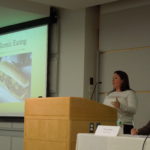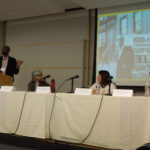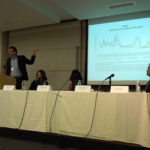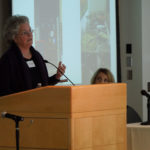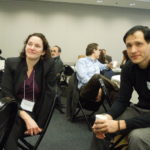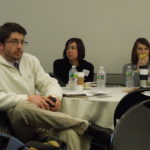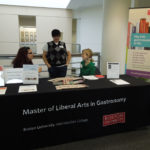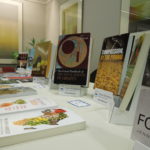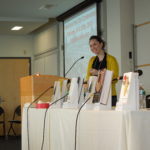Sating the More Insistent Hungers at the BU Food and the City Conference
by Brad Jones | with photos by Lucia Austria
As the first food and history symposium to be sponsored by Boston University, the Food and the City Conference went extraordinarily well. The Gastronomy Program’s very own Ken Albala set the event’s tone in his conference keynote. He suggested a very historical perspective through which to see the contemporary American cultural zeitgeist of locavorism, artisanship, integrity, and tradition. He posited that history operates in cycles and that the current movement away from industrialism and modernity is merely a particular incarnation of the age-old conflict between progress and romance—between looking forward and looking back.
While this thesis may certainly engender disagreement, I have my own concerns with thinking about the past and its influence on the present in a structurally conditioned way. Ken highlights the way in which history, and food history more specifically, can be and is an important and fruitful conceptual lens toward thinking about not only our contemporary world but also the world we will inhabit to come. Alas, Babson College professor Fredrick Douglass Opie was incessant in suggesting that food culture and food practices of the past should be neither anachronisms nor artifacts: that any good historical research is sure to inform an ongoing discourse in the present. Dr. Opie’s blog, Food as a Lens, does just that by exploring “the history of food traditions, culture, and systems and the history of campaigns and movements for, about, and involving food.”
Indeed the conference informed present discourse! The topics presented at the conference were of great depth and breadth and they reveal just how important an interdisciplinary approach is when conducting food studies. While positioned in the discipline of history, we heard papers on markets, economics, policy, activism, identity, nationality, culture, social class, and social change. Arguably the most enthusiastic presentation was given by Chrissie Reilly, a PhD student of Warren Belasco, who proved once again, this time through the lens of the Philly Cheesesteak, that food can not only be delicious to eat but nourishing to think in her paper “Hungering for Authenticity: Consuming the Cheesesteak in Philadelphia and Beyond.”
BU History Chair Bruce Schulman in his welcome went so far as to suggest that it is with food that we attempt “to sate our wilder, more insistent, hungers”—not mere visceral desires but pangs of justice, truth, civilization, nature, and, in the end, what it means to be human. I must confess for my own part, that rather than being sated at the Food and the City conference, these appetites were only increasingly whetted.
Brad Jones is a Gastronomy student. He also works at Formaggio Kitchen.


